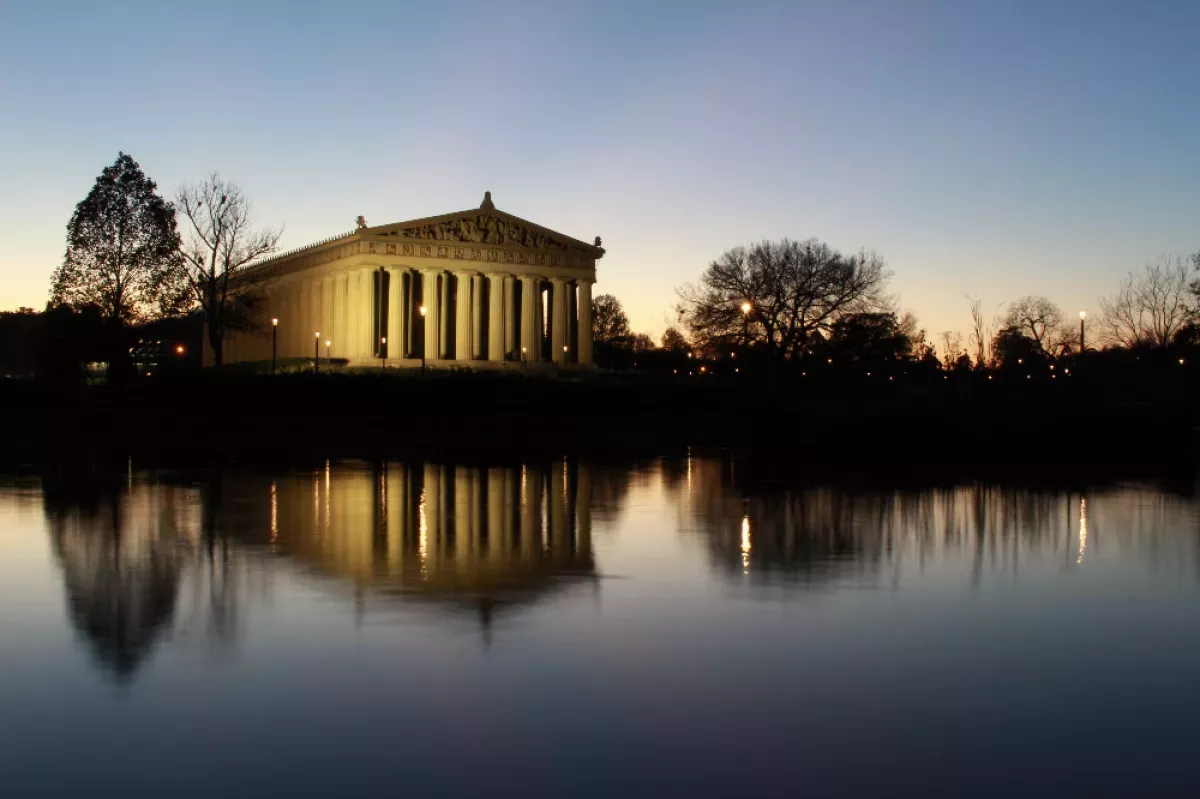Nashville, Tennessee, is the state's capital and most populous city, situated on the Cumberland River in Middle Tennessee. As of the 2020 census, the city had a population of 689,447, making it the 21st-most populous city in the U.S. Its metropolitan area, home to over 2.15 million people, ranks as the 35th-largest nationally. Nashville is recognized as one of the fastest-growing cities in the United States.
1909: Jo Byrns Represents 5th District
Jo Byrns represented the 5th district from 1909 to 1936.
1912: Tennessee Agricultural and Industrial and Normal School Moved
In 1912, the Tennessee Agricultural and Industrial and Normal School was moved to Jefferson Street.
1912: Goo Goo Clusters Introduced
Since 1912, Nashville has been known for Southern confections, including Goo Goo Clusters, which have been made in Nashville since that year.
1918: Nashville as "Powder City of the World"
Due to a short-lived smokeless gunpowder plant in 1918, Nashville also had the nickname "Powder City of the World".
1925: Grand Ole Opry Establishment
In 1925, the establishment of the Grand Ole Opry marked the beginning of Nashville's journey as the 'Country Music Capital of the World'.
1928: Democrats Fail to Carry Davidson County in Presidential Election
In 1928, Democratic presidential candidates failed to carry Davidson County.
1929: Francis Craig Orchestra Performance
From 1929 to 1945, The Francis Craig Orchestra entertained Nashvillians from the Oak Bar and Grille Room in the Hermitage Hotel.
1936: Jo Byrns Represents 5th District
Jo Byrns represented the 5th district from 1909 to 1936.
1939: Nashville Rebels Play in the American Football League
In 1939, the Nashville Rebels played in the American Football League.
1941: Percy Priest Represents 5th District
Percy Priest represented the district from 1941 to 1956.
1944: Nashville Invitational Golf Tournament
From 1944 to 1946, the Nashville Invitational was a golf tournament on the PGA Tour.
1945: End of Francis Craig Orchestra Performance
From 1929 to 1945, The Francis Craig Orchestra entertained Nashvillians from the Oak Bar and Grille Room in the Hermitage Hotel.
1945: Prince's Hot Chicken Shack Originates
In 1945, the first Prince's Hot Chicken Shack originated at the corner of Jefferson Street and 28th Avenue.
1946: Nashville Invitational Golf Tournament
From 1944 to 1946, the Nashville Invitational was a golf tournament on the PGA Tour.
1949: Percy Priest House Majority Whip
From 1949 to 1953, Percy Priest House Majority Whip.
1950: Lynchings in Davidson County
From 1877 to 1950, a total of six lynchings of Blacks were conducted in Davidson County.
1950: Nashville Coined "Music City"
In 1950, radio announcer David Cobb coined the moniker "Music City" to describe Nashville.
1950: New City Charter Approved
In 1950, the state legislature approved a new city charter that provided for the election of city council members from single-member districts.
1951: African Americans Elected to City Council
In 1951, after passage of the new charter, African American attorneys Z. Alexander Looby and Robert E. Lillard were elected to the city council.
1953: Percy Priest House Majority Whip
From 1949 to 1953, Percy Priest House Majority Whip.
1954: Brown vs. Board of Education
In 1954, the United States Supreme Court ruled that public schools had to desegregate with "all deliberate speed".
1956: Lawsuit Filed for School Desegregation
In 1956, the family of student Robert Kelley filed a lawsuit arguing for the desegregation of East High School.
1956: Percy Priest Represents 5th District
Percy Priest represented the district from 1941 to 1956.
1957: Desegregation of School System
In 1957 Nashville desegregated its school system using an innovative grade a year plan, in response to a class action suit Kelly vs. Board of Education of Nashville.
1957: Life & Casualty Tower Completed
In 1957, the Life & Casualty Tower, Nashville's first skyscraper, was completed, initiating high-rise construction in downtown Nashville.
1957: "Nashville Plan" Announced
In the fall of 1957, the courts announced the "Nashville Plan", where the city's public schools would desegregate one grade per year.
1958: Referendum on City and County Government Consolidation
In 1958, a referendum was held on the issue of consolidating city and county government, but it failed to gain approval.
1958: Fairgrounds Speedway Hosts NASCAR Races
In 1958, the Fairgrounds Speedway in Nashville, the second-oldest continually operating racetrack in the United States, began hosting NASCAR Winston Cup races.
February 13, 1960: Nashville Sit-ins Begin
On February 13, 1960, the Nashville sit-ins began, part of an effort to end racial segregation of public facilities.
April 19, 1960: Bombing of Z. Alexander Looby's House
On April 19, 1960, the house of Z. Alexander Looby, an African American attorney and council member, was bombed by segregationists.
May 10, 1960: End of Nashville Sit-ins
The Nashville sit-in ended successfully in May 10, 1960, under Mayor West.
1960: Nashville as a Record-Producing Center
In 1960, Time reported that Nashville had "nosed out Hollywood as the nation's second biggest (after New York) record-producing center."
1961: Women's Western Open
In 1961, Women's Western Open was held in Nashville.
1962: Second Charter for Metropolitan Government Approved
In 1962, the second charter for metropolitan government was approved, proposing two levels of service provision: the General Services District and the Urban Services District.
1963: Government Consolidation with Davidson County
In 1963, Nashville consolidated its government with Davidson County, forming a metropolitan government.
1963: Nashville and Davidson County Merge
In 1963, the city of Nashville and Davidson County merged to form the Metropolitan Government of Nashville and Davidson County, also known as "Metro Nashville," to address urban sprawl issues. The government was split into two service districts: the "urban services district" and the "general services district".
1963: Consolidated City-County Government
Since 1963, Nashville has had a consolidated city-county government composed of six smaller municipalities in a two-tier system.
1964: Civil Rights Legislation Passed
Congress passed civil rights legislation in 1964 and tensions continued as society was slow to change.
1965: Civil Rights Legislation Passed
Congress passed civil rights legislation in 1965 and tensions continued as society was slow to change.
January 1966: Lowest temperature at Old Hickory
Temperatures in Old Hickory have been known to range from −10 °F (−23.3 °C) in January 1966.
1966: Complete Desegregation of School System
By 1966 the Metro Council abandoned the grade a year plan and completely desegregated the entire school system at one time.
April 8, 1967: Riot at Fisk and Tennessee State Universities
On April 8, 1967, a riot broke out on the college campuses of Fisk University and Tennessee State University after Stokely Carmichael spoke about Black Power at Vanderbilt University.
1968: Democrats Fail to Carry Davidson County in Presidential Election
In 1968, Democratic presidential candidates failed to carry Davidson County.
1968: Republicans Almost Win 5th District
In the mid-1960s and early 1970s, Republicans made a few spirited challenges to the 5th district, almost winning the district in 1968.
1970: Average Summer temperature
From 1970 to 2020 the average summer temperature has risen 2.8 degrees F (1.5 C).
1970: Little League Team Qualifies for World Series
In 1970, one Little League Baseball team from Nashville qualified for the Little League World Series.
March 15, 1971: March 15, 1971
Events for March 15, 1971. No information is available for this entry.
1972: Democrats Fail to Carry Davidson County in Presidential Election
In 1972, Democratic presidential candidates failed to carry Davidson County.
1972: Opryland USA Theme Park Opens
In 1972, the Opryland USA theme park opened in Nashville. It operated until 1997.
1972: Republican Candidate Gains 38% of Vote
In 1972, the Republican candidate gained 38% of the vote, even as Nixon carried the district in the presidential election by a large margin.
1974: Grand Ole Opry Move
In 1974, the Grand Ole Opry moved from the Ryman Auditorium to the Grand Ole Opry House, located 9 miles east of downtown Nashville.
1978: Nashville Sounds Established
In 1978, the Nashville Sounds baseball team was established as an expansion franchise of the Double-A Southern League.
October 9, 1979: Amtrak's Floridian Cancelled
On October 9, 1979, Amtrak's Floridian train, which served Union Station, was cancelled due to poor track conditions resulting in late trains and low ridership, ending over 120 years of intercity rail service in Nashville.
1979: Ku Klux Klan Cross Burnings
In 1979, the Ku Klux Klan burnt crosses outside two African American sites in Nashville, including the city headquarters of the NAACP.
1979: Sounds Win League Championship
In 1979, the Nashville Sounds won the Double-A Southern League championship.
1980: U.S. Women's Open
In 1980, U.S. Women's Open was held in Nashville.
1982: Sounds Win League Championship
In 1982, the Nashville Sounds won the Double-A Southern League championship.
1983: CoreCivic Founded
In 1983, CoreCivic, originally known as Corrections Corporation of America, was founded in Nashville. It is one of the largest private corrections companies in the United States.
1984: Democrats Fail to Carry Davidson County in Presidential Election
In 1984, Democratic presidential candidates failed to carry Davidson County.
1984: Fairgrounds Speedway Hosts NASCAR Races
In 1984, the Fairgrounds Speedway in Nashville stopped hosting NASCAR Winston Cup races.
1984: Gibson Headquarters Move
Since 1984, Nashville has been the headquarters of guitar company Gibson.
January 21, 1985: Coldest Temperature Recorded
On January 21, 1985, the coldest temperature ever officially recorded in Nashville was −17 °F (−27 °C).
1985: Double-A Sounds Replaced
In 1985, the Double-A Nashville Sounds were replaced by a Triple-A team of the American Association.
1988: Sara Lee Classic Begins
From 1988 to 2002, the Sara Lee Classic was part of the LPGA Tour.
1988: Democrats Fail to Carry Davidson County in Presidential Election
In 1988, Democratic presidential candidates failed to carry Davidson County.
1990: Foreign-born population in Nashville
In 1990 Nashville's foreign-born population was 12,662.
1994: BellSouth Senior Classic Begins
From 1994 to 2003, the BellSouth Senior Classic of the Champions Tour was held.
1994: AT&T Building Completed
In 1994, the AT&T Building (Batman Building) was completed, though downtown Nashville experienced little construction until the mid-2000s.
May 1997: International Garage Door Exposition
In May 1997, Nashville hosted the International Garage Door Exposition, marking the first professional certification examinations by IDEA.
1997: Awarded National Hockey League Expansion Team
In 1997, Nashville was awarded a National Hockey League expansion team; this was named the Nashville Predators.
1997: American Association Dissolved
In 1997, the American Association dissolved.
1997: Houston Oilers Relocate to Tennessee
In 1997, the Houston Oilers relocated to Tennessee and played at the Liberty Bowl Memorial Stadium in Memphis for one season as the Tennessee Oilers.
1997: Opryland USA Closes
In 1997, the Opryland USA theme park was closed by its owners and soon after demolished to make way for the Opry Mills mega-shopping mall.
April 16, 1998: Severe Thunderstorms
On April 16, 1998, Nashville experienced severe thunderstorms bringing tornadoes, large hail, flash floods and damaging wind.
1998: Marsha Blackburn in State Senate
From 1998 to 2002 Marsha Blackburn represented a portion of Nashville in the state senate.
1998: NFL Team Debuts in Nashville
In 1998, the NFL team debuted in Nashville at Vanderbilt Stadium.
1998: Nashville Predators Join NHL
In 1998, the Nashville Predators joined the National Hockey League as an expansion team for the 1998-99 season.
1998: Sounds Join Pacific Coast League
In 1998, the Nashville Sounds joined the Triple-A Pacific Coast League.
1998: Oilers Move to Nashville
In 1998, the Tennessee Oilers moved to Nashville and played in Vanderbilt Stadium for one season.
1998: The Tennessean Competes with Nashville Banner
Until 1998, The Tennessean competed with the Nashville Banner.
1999: Titans Name Change
In 1999, the Tennessee Oilers changed its name to the Tennessee Titans and opened Nissan Stadium.
1999: Opening of Nissan Stadium
In the summer of 1999, Nissan Stadium (formerly Adelphia Coliseum and LP Field) opened.
October 2000: The City Paper Founded
The City Paper was founded in October 2000.
2000: Increased foreign-born population
In 2000 Nashville's foreign-born population was 39,596.
2000: Al Gore Carries Nashville in Presidential Election
In the 2000 presidential election, Tennessean Democrat Al Gore carried Nashville with over 59% of the vote.
2000: Nashville Construction Boom
Since 2000, Nashville has experienced two urban construction booms, leading to the development of numerous high-rises.
2001: Nashville Superspeedway Opens
In 2001, Nashville Superspeedway opened and held NASCAR sanctioned events from 2001 to 2011 as well as IndyCar races from 2001 to 2008.
2001: Nashville Kats End First Run
The Nashville Kats arena football team of the Arena Football League ended it's first run in 2001.
2002: Sara Lee Classic Ends
From 1988 to 2002, the Sara Lee Classic was part of the LPGA Tour.
2002: Marsha Blackburn in State Senate
From 1998 to 2002 Marsha Blackburn represented a portion of Nashville in the state senate.
2003: BellSouth Senior Classic Ends
From 1994 to 2003, the BellSouth Senior Classic of the Champions Tour was held.
2003: Nashville in the 7th District
From 2003 to 2013, a sliver of southwestern Nashville was located in the 7th District, represented by Republican Marsha Blackburn.
2003: Snowfall event since 2003
Since 2003 the largest snow event happened on January 22, 2016, when Nashville received 8 inches of snow in a single storm.
2003: Nashville Predators Playoff Run
Since the 2003 season, the Nashville Predators have made the playoffs in all but four seasons.
2004: John Kerry Carries Nashville in Presidential Election
In the 2004 election, Democrat John Kerry carried Nashville with 55% of the vote.
2005: Iraqi expats to vote
In 2005, Nashville was one of the few international locations where Iraqi expatriates could vote in the Iraqi election .
2005: Sounds Win League Championship
In 2005, the Nashville Sounds won the Triple-A Pacific Coast League championship.
2005: Nashville Kats Return
The Nashville Kats arena football team of the Arena Football League returned in 2005.
April 7, 2006: Severe Thunderstorms
On April 7, 2006, Nashville experienced severe thunderstorms bringing tornadoes, large hail, flash floods and damaging wind.
September 2006: Schermerhorn Symphony Center Opens
In September 2006, the Schermerhorn Symphony Center opened as the home of the Nashville Symphony.
September 18, 2006: Music City Star Launched
On September 18, 2006, Nashville launched a passenger commuter rail system called the Music City Star (now the WeGo Star).
2006: Nashville Roller Derby Established
In 2006, Nashville Roller Derby, Nashville's only women's flat track roller derby team, was established.
2006: Nissan North America Headquarters Move
In 2006, Nissan North America moved its corporate headquarters from Gardena, California, to Franklin, a suburb of Nashville.
June 2007: Temperature data collection start
Data for record temperatures is spotty before June 2007 at Old Hickory Dam
2007: Nashville Kats End Second Run
The Nashville Kats arena football team of the Arena Football League ended it's second run in 2007.
February 5, 2008: Severe Thunderstorms
On February 5, 2008, Nashville experienced severe thunderstorms bringing tornadoes, large hail, flash floods and damaging wind.
2008: Nashville Superspeedway Held IndyCar Races
From 2001 to 2011, Nashville Superspeedway held NASCAR sanctioned events as well as IndyCar races from 2001 to 2008.
2008: Barack Obama Carries Nashville in Presidential Election
In 2008, Barack Obama carried Nashville with 60% of the vote.
2008: Nashville Ranked for Allergies
In 2008, Nashville was ranked as the 26th-worst spring allergy city in the U.S. by the Asthma and Allergy Foundation of America.
2008: Shop at Home Network Signed Off
Shop at Home Network signed off in 2008.
January 22, 2009: Rejection of Nashville Charter Amendment 1
On January 22, 2009, residents rejected Nashville Charter Amendment 1, which sought to make English the official language of the city.
April 10, 2009: Severe Thunderstorms
On April 10, 2009, Nashville experienced severe thunderstorms bringing tornadoes, large hail, flash floods and damaging wind.
2009: Bhutanese refugees resettled
In 2009, about 60,000 Bhutanese refugees were being admitted to the U.S., and some were expected to resettle in Nashville.
2010: 5th District Regains All of Nashville
After the 2010 census, the 5th regained all of Nashville.
2010: Nashville Flooding
Between May 1 and 7, 2010, much of Nashville was extensively flooded, causing extensive damage and eleven deaths. Damages were estimated to be over $2 billion.
2010: Population in 2010
In 2010 the population in Nashville was 601,222 residents.
2010: Lakewood Votes to Dissolve City Charter
In 2010, Lakewood residents voted to dissolve the city's charter and join the metropolitan government.
2010: Severe Thunderstorms
In 2010, Nashville experienced severe thunderstorms bringing tornadoes, large hail, flash floods and damaging wind on May 1–2.
2010: Household Statistics
In 2010, Nashville had 254,651 households and 141,469 families, with various household compositions.
2010: The Pinnacle Opens
In 2010, The Pinnacle, a high-rise office building, opened as the first skyscraper built in Nashville in 15 years.
2010: Increased Housing Costs in North Nashville
In 2010, the median home price in North Nashville was $100,710, marking the start of a decade of significant change and growth in population.
2011: Lakewood Votes Again to Dissolve City Charter
In 2011, Lakewood residents voted a second time to dissolve the city's charter and join the metropolitan government, with both votes passing.
2011: Nashville Superspeedway Suspends Operations
In 2011, Nashville Superspeedway suspended operations after hosting NASCAR sanctioned events from 2001 to 2011 as well as IndyCar races from 2001 to 2008.
March 2012: Nashville Ranked in Top Five for Job Growth
In March 2012, a Gallup poll ranked Nashville in the top five regions for job growth.
June 29, 2012: Hottest Temperature Recorded
On June 29, 2012, the hottest temperature ever officially recorded in Nashville was 109 °F (43 °C).
July 2012: Hottest temperature at Old Hickory
Temperatures in Old Hickory reached 106 °F (41.1 °C) in June and July 2012.
2012: Health Care Industry Impact
As of 2012, the health care industry in Nashville contributed US$30 billion per year and 200,000 jobs to the Nashville-area economy.
2012: Goodlettsville Team Qualifies for World Series
In 2012, a team from neighboring Goodlettsville qualified for the Little League World Series, giving the metropolitan area teams in three consecutive years to so qualify.
May 2013: Music City Center Opens
In May 2013, the Music City Center, a 1,200,000-square-foot convention center with 350,000 square feet of exhibit space, opened in Nashville.
August 2013: The City Paper Folds
In August 2013, The City Paper folded after having been founded in October 2000.
August 27, 2013: Mayor Reveals Riverfront Park Plans
On August 27, 2013, Nashville Mayor Karl Dean announced plans for the development of two new riverfront parks along the Cumberland River in downtown Nashville. The project includes an outdoor amphitheater on the west bank and a river landing on the east bank.
2013: Nashville in the 7th District
From 2003 to 2013, a sliver of southwestern Nashville was located in the 7th District, represented by Republican Marsha Blackburn.
2013: Ranked No. 5 for Business
In 2013, Nashville ranked No. 5 on Forbes' list of the Best Places for Business and Careers.
2013: Nashville Described as "Nowville" and "It City"
In 2013, Nashville was described as "Nowville" and "It City" by GQ, Forbes, and The New York Times.
2013: Little League Team Qualifies for World Series
In 2013, one Little League Baseball team from Nashville qualified for the Little League World Series.
2014: Nashville Hosts WFTDA Championships
In 2014, Nashville hosted the WFTDA Championships at Municipal Auditorium.
2014: Little League Team Qualifies for World Series
In 2014, one Little League Baseball team from Nashville qualified for the Little League World Series.
2014: BNA Establishes Dedicated Pick-Up and Drop-Off Areas
In late 2014, Nashville International Airport (BNA) became the first major U.S. airport to establish dedicated pick-up and drop-off areas for vehicle for hire companies.
June 26, 2015: First Same-Sex Wedding Officiated
On June 26, 2015, Megan Barry officiated at the city's first same-sex wedding.
September 25, 2015: Megan Barry Elected First Female Mayor
Nashville elected its first female mayor, Megan Barry, on September 25, 2015.
October 2015: Real Estate Projects Underway
As of October 2015, city figures showed more than $2 billion in real estate projects underway or projected to start in 2016.
2015: Nashville Households Without a Car
In 2015, 7.9% of city of Nashville households were without a car.
2015: Named Top City for Economic Growth Potential
In 2015, Business Facilities' 11th Annual Rankings report named Nashville the number one city for Economic Growth Potential.
2015: American Jewish Community
In 2015, the American Jewish community in Nashville numbered about 8,000, plus 2,000 Jewish college students.
2015: Sounds Leave Greer Stadium
In 2015, the Nashville Sounds left Herschel Greer Stadium for First Horizon Park.
January 22, 2016: 8 Inches of Snow in Nashville
On January 22, 2016, Nashville received 8 inches of snow in a single storm, making it the largest snowfall event since 2003.
2016: American Community Survey on Commuting
According to the 2016 American Community Survey, 78.1% of working Nashville residents commuted by driving alone. In 2016, Nashville averaged 1.72 cars per household.
2016: Nashville Attractiveness to Real Estate Investors
In 2016, Nashville ranked seventh nationally in terms of attractiveness to real estate investors, according to a survey of nearly 1,500 real estate industry professionals.
2016: Goodlettsville Team Qualifies for World Series
In 2016, a team from neighboring Goodlettsville qualified for the Little League World Series, giving the metropolitan area teams in three consecutive years to so qualify.
2016: Nashville Predators win Conference Championship
In 2016, the Nashville Predators won Conference Championship.
2016: Nashville Golf Open Part of Web.com Tour
Since 2016, the Nashville Golf Open has been part of the Web.com Tour.
May 2017: Nashville Most Populous City in Tennessee
In May 2017, census estimates showed Nashville had passed Memphis to become the most populated city in Tennessee.
2017: Bachelorette Parties on Lower Broadway
In 2017, Nashville Scene counted 33 bachelorette parties on Lower Broadway in less than two hours on a Friday night, noting the actual number was likely higher.
2017: Fastest-Growing Economy
In 2017, Nashville had the third-fastest-growing metropolitan economy in the United States, adding an average of 100 people a day to its net population increase.
2017: Nashville's Economy Growth
In 2017, Nashville's economy was deemed the third fastest-growing in the nation.
2017: Nashville Pension Fund Stake in CoreCivic
In 2017, the City of Nashville's pension fund held a $921,000 stake in CoreCivic. A drop in CoreCivic's stock value could impact the pension fund, which represents nearly 25,000 current and former Metro employees.
2017: Nashville Predators Make Stanley Cup Finals
In 2017, the Nashville Predators made the Stanley Cup Finals for the first time in franchise history, but ultimately fell to the Pittsburgh Penguins.
2017: Nashville Predators win Division Championship
In 2017, the Nashville Predators won Division Championship.
January 18, 2018: CabaRay Opens
On January 18, 2018, the CabaRay, Ray Stevens' performing venue offering a Vegas-style dinner and show atmosphere, opened in West Nashville.
March 6, 2018: Mayor Barry Resigns
On March 6, 2018, Mayor Barry resigned due to felony charges of misuse of public funds, leading to a special election call.
May 1, 2018: Voters Reject Let's Move Nashville
On May 1, 2018, Nashville voters rejected Let's Move Nashville, a referendum to fund an $8.9 billion mass transit system, by a 2 to 1 margin.
May 2018: AllianceBernstein Plans Nashville Office
In May 2018, AllianceBernstein pledged to build a private client office in Nashville by mid-2019 and move its headquarters from New York City to Nashville by 2024.
May 24, 2018: David Briley Wins Special Election
On May 24, 2018, David Briley won the special election, becoming the 70th mayor of Nashville, after the Tennessee Supreme Court set the election date.
November 2018: Amazon Announces Operations Center
In November 2018, Amazon announced its plans to build an operations center in the Nashville Yards development to serve as the hub for their Retail Operations division.
2018: Nashville's Homelessness Crisis
As of 2018, between 2,300 and 20,000 Nashvillians are homeless.
2018: Nashville Hottest Destination for Bachelorette Parties
In 2018, The New York Times called Nashville "the hottest destination for bachelorette parties in the country" due to the honky-tonk bars' live music.
2018: Expansion Plan Rejected
In 2018, an expansion plan that included use of bus rapid transit and light rail service was rejected by voters.
2018: Nashville Predators win Division Championship
In 2018, the Nashville Predators won Division Championship.
September 28, 2019: John Cooper Becomes Mayor
On September 28, 2019, John Cooper became the ninth mayor of the Metropolitan Government of Nashville and Davidson County.
December 2019: iHeartMedia Selects Nashville
In December 2019, iHeartMedia selected Nashville as the site of its second digital headquarters.
2019: Nashville Hosts NFL Draft
From April 25–27, 2019, Nashville hosted the 2019 NFL draft, attracting an estimated 200,000 fans each day.
2019: AllianceBernstein build a private client office in the city
In 2019, AllianceBernstein pledged to build a private client office in the city by mid-2019.
2019: CoreCivic Moves Out of Nashville
In 2019, CoreCivic, one of the largest private corrections companies in the United States, moved its headquarters out of Nashville.
2019: Significant Sites Identified
In 2019, many of the significant sites reflecting the places that shaped Nashville's culture were identified and placed in the national database of The Cultural Landscape Foundation.
March 3, 2020: Tornado Devastates Nashville
On March 3, 2020, a tornado struck areas north of downtown Nashville, resulting in at least 25 fatalities and leaving tens of thousands without electricity.
December 25, 2020: Second Avenue Explosion
On December 25, 2020, a vehicle exploded on Second Avenue in Nashville, killing the perpetrator and injuring eight others.
2020: Nashville as a Global City
As of 2020, Nashville is considered a global city, type "Gamma" by the GaWC. It's a major center for the music, healthcare, publishing, banking, automotive, and technology industries.
2020: Nashville Metropolitan Area Population
As of 2020, the Nashville metropolitan area had a population of 2,014,444, making it the largest in Tennessee.
2020: Population Increase
As of the 2020 United States census, the Nashville population was 689,447, representing the largest net population increase in the city's history.
2020: Unaffordable Housing for Black and Hispanic Families
By 2020, 99% of Nashville's neighborhoods were considered unaffordable for Black and Hispanic families earning median incomes, with the median home price in North Nashville increasing to $532,121.
2020: Amtrak Considers Atlanta to Nashville Service
In 2020, Amtrak indicated it was considering a service that would run from Atlanta to Nashville by way of Chattanooga.
2020: Nashville SC Inaugural Season
In 2020, Nashville SC, a Major League Soccer franchise, began play at Nissan Stadium.
2020: Music City Fire Begin Play
In 2020, the Music City Fire, an arena football team of the American Arena League, began play at the Williamson County AgExpo Park.
2020: Nashville Population
In 2020, the population of Nashville was 689,447 according to the census.
April 2021: Oracle Announces Nashville Campus
In April 2021, Oracle Corporation announced plans to construct a $1.2 billion campus in Nashville, expected to employ 8,500 by 2031.
2021: Nashville Metropolitan Statistical Area Population
As of 2021, Nashville's metropolitan statistical area (MSA) had a population of about 2 million people, according to the U.S. Census Bureau estimate.
2021: Nashville Superspeedway Reopens
In 2021, Nashville Superspeedway reopened and began hosting the premier NASCAR Cup Series race Ally 400 annually.
2021: Sounds Placed in Triple-A East
In 2021, the Nashville Sounds were placed in the Triple-A East.
2022: GOP Redistricting Cycle
In 2022 redistricting cycle, A Republican gerrymander 'cracked' the Democratic stronghold of Nashville across three otherwise Republican districts.
2022: Nashville began regulating party buses
In 2022 the city began regulating party buses that provide transportainment in downtown, issuing dozens of permits and rejecting applications for dozens more.
2022: Nashville SC Move to Geodis Park
In 2022, Nashville SC moved into the newly completed soccer-specific stadium Geodis Park at the Nashville Fairgrounds.
2022: Triple-A East Becomes International League
In 2022, the Triple-A East became the International League, with the Nashville Sounds as a member.
March 27, 2023: Covenant School Shooting
On March 27, 2023, a shooting at the Covenant School resulted in the deaths of three children and three staff members before the gunman was fatally shot by police.
April 2023: Nashville High-Rise Buildings
As of April 2023, Nashville has 33 towers of 300 feet tall or taller, with 24 of those buildings completed since 2000.
September 25, 2023: Freddie O'Connell Becomes Mayor
On September 25, 2023, Freddie O'Connell became the tenth mayor of the Metropolitan Government of Nashville and Davidson County, focusing on improving transportation.
December 9, 2023: Tornadoes Cause Destruction
On December 9, 2023, tornadoes caused considerable destruction in Nashville, resulting in three deaths.
2023: Nashville International Airport Statistics
In 2023, Nearly 23 million passengers visited Nashville International Airport, making it the 29th busiest airport in the US.
2023: Nashville Congressional District Split
In 2023, the GOP-controlled state legislature controversially split Nashville into parts of the 5th, 6th, and 7th districts in a partisan gerrymander.
January 2024: Brief gap in temperature data
There was another brief gap in temperature data in January 2024 at Old Hickory Dam
November 5, 2024: Choose How You Move Referendum Passed
On November 5, 2024, the Choose How You Move referendum passed, establishing dedicated funding for transportation and associated infrastructure.
2024: AllianceBernstein Move
AllianceBernstein planned to move its headquarters from New York City to Nashville by 2024.
2024: Expansion Plan Passed
In 2024, A subsequent expansion plan focused on improving sidewalks, adding smart signals, upgrading bus stops and transit centers, implementing a 24-hour bus service and adding 54 miles of high-capacity transit corridors was passed.
2024: Nashville Population Estimate
In 2024, Nashville's population was estimated to be 704,963.
2031: Oracle Corporation employing 8,500 employees
In April 2021, Oracle Corporation announced plans to construct a $1.2 billion campus in Nashville, expected to employ 8,500 by 2031.
Mentioned in this timeline

Barack Obama the th U S President - was the...

Gunpowder also known as black powder is the oldest known...

George W Bush the rd U S President - is...
California is a U S state on the Pacific Coast...

Oracle Corporation a multinational computer technology company headquartered in Austin...

Marsha Blackburn is an American politician and businesswoman currently serving...
Trending

30 minutes ago Tsitsipas criticizes ATP over broken promises and inhumane Masters 1000 format.

30 minutes ago Sarah Spain Describes Feeling 'Ill' Near JD Vance at Winter Olympics

1 hour ago Priyanka Chopra shines at Harvard, credits Bollywood stars for Hollywood success.

2 hours ago Civil Rights Icon Jesse Jackson Passes Away at 84: A Legacy Remembered

1 day ago Democrats and Europe grapple with Trump's impact; Newsom says Trump unified Europe.

2 hours ago Elise Mertens faces Emma Navarro in WTA Dubai 2026; Predictions and Odds
Popular
Randall Adam Fine is an American politician a Republican who...

Pam Bondi is an American attorney lobbyist and politician currently...

Kid Rock born Robert James Ritchie is an American musician...

Jesse Jackson is an American civil rights activist politician and...

Barack Obama the th U S President - was the...
The Winter Olympic Games a major international multi-sport event held...
